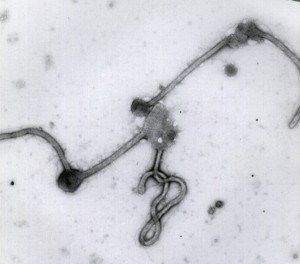
This undated photo made available by the Antwerp Institute of Tropical Medicine in Antwerp, Belgium, shows the Ebola virus viewed through an electron microscope. AP FILE PHOTO
MANILA, Philippines–If the deadly Ebola virus enters the Philippines, the local primary and secondary hospitals will have a hard time containing its spread, according to an infectious disease specialist.
At a health forum on Tuesday, Dr. Ludovico Jurao said the infection control committees in these hospitals were not fully capable of managing such a highly contagious disease and, without the help of experts, they may even contribute to an outbreak.
“In containing Ebola, an infected patient must be confined to one room. But in secondary hospitals, patients stay in wards so the rate of transmission of diseases is high,” said Jurao, who is also president of the Philippine Society for Microbiology and Infectious Diseases (PSMID).
Jurao said the PSMID had 200 members who could be tapped to help these hospitals.
“There is really no way to curb the spread of the disease but through strong infection control measures in hospitals,” he said.
But he also stressed that the key to preventing Ebola from entering the country was for those who come from Ebola-hit countries in West Africa, especially returning Filipino migrant workers, to fully disclose their health condition and their whereabouts upon arrival in the Philippines.
He said some overseas Filipino workers had a tendency to keep to themselves information about their health to prevent them from being separated from their families.
“It’s really up to them… but we have to make sure they understand the risks of keeping pertinent information from their doctors, especially to their families,” he said.
Jurao recalled a patient who created a Middle East respiratory syndrome coronavirus (Mers-COV) scare earlier this year when she disclosed that she had come in contact with an infected person abroad two days after being admitted to a local hospital.
“These OFWs want to go home to their families so they keep the information from us… it’s human nature. But they must be aware of the risks,” said Jurao.
He also advised returning Filipinos to observe precautionary measures to ensure that they do not become the cause of the spread of the fatal disease in the country.


